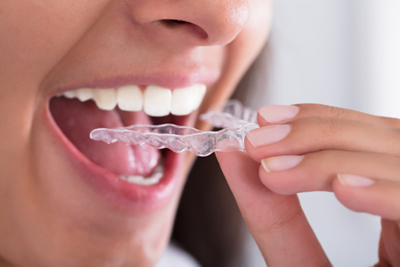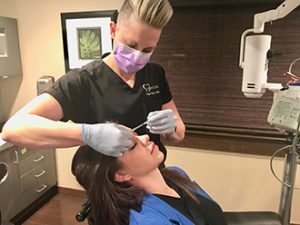Do you suffer from frequent headaches, neck soreness or jaw pain? Do you have trouble sleeping at night? Is this your new ‘normal’? These symptoms might be the result of Temporomandibular Joint Disorder, otherwise known as TMJ or TMD. Our team of dentists at Dentistry of Colorado offer expert TMJ diagnosis and TMJ treatment options.
What is TMJ?
Temporomandibular joint and muscle disorders, often referred to as TMJ, are conditions that cause dysfunction and pain in the jaw joint and muscles. These conditions limit the opening or closing of your mouth, and can even cause your jaw to lock open or closed. Patients with TMJ disorder often feel a popping in their joint when opening their mouth.
 The temporomandibular joint (TMJ) connects your lower jaw bone, called the mandible, to temporal bone, which is the bone at the side of your head.
The temporomandibular joint (TMJ) connects your lower jaw bone, called the mandible, to temporal bone, which is the bone at the side of your head.
If you touch your face in front of your ears and open your mouth, you can feel the joints. These joints allow you to make different motions involved in talking, chewing, yawning, etc. The TMJ joints hinge and slide, which makes it one of the more complicated joints in the body.
The National Institute of Dental and Craniofacial Research estimates that more than 10 million Americans are affected by the disorder. However, it tends to be more common in women.
What Causes TMJ?
The exact cause of TMJ disorder is difficult to determine. The pain could be the result of genetics, arthritis or jaw injury. Patients who have jaw pain usually clench or grind their teeth, however, this does not mean you will develop TMJ disorder. It is important for the patient and the dentist to distinguish the cause, so we come up with the appropriate TMJ treatment plan.
Some known TMJ causes include:
- Persistent clenching or grinding of the jaw (bruxism)
- Autoimmune diseases (in which the body’s immune cells attack healthy tissue)
- Infections
- Injuries to the jaw area
- Dental procedures (even prolonged mouth opening)
- Insertion of a breathing tube before surgery.
- Various forms of arthritis
Symptoms of TMJ
The pain of TMJ disorders is often described as a dull, aching pain, which comes and goes in the jaw joint and nearby areas. However, some patients report no pain but still have problems moving their jaws.
Symptoms may include the following:
- Pain in the jaw joint and chewing muscles
- Limited movement or locking of the jaw
- Ear pain, pressure, fullness, ringing in the ears (tinnitus)
- Painful clicking, popping or grating in the jaw joint when opening or closing the mouth
- A bite that does not feel right
- Pain that radiates into the neck and shoulders
- Difficulty sleeping
How is TMJ Treated?
You can try some simple self-care practices are often ease symptoms, like eating soft foods, applying ice to the area or taking over-the-counter pain medications (nonsteroidal anti-inflammatories).
Night Guards

Mild cases of TMJ can be treated with removable mouth guards, depending on your diagnosis. A night guard is an acrylic splint you wear while you are sleeping that protects your teeth and keeps your bite slightly open, which can help your jaw relax. These days, night guards are not near as bulky or obtrusive as they once were.
It is important that you get a night guard that is custom fitted by a dentist for your teeth. Store bought night guards will very often not help and could actually make things much worse.
All of our night guards are custom made for you at our in-house dental lab. If we determine that a night guard would be the right treatment for your TMJ, it is a simple process to get one made for you. We take impressions of your teeth and within a couple weeks, the night guard will be done. We’ll have you come back in so that we can adjust the fit to make it perfect for your teeth. If you need further adjustments, just come back into the office and we’ll take care of it.
BOTOX®
 Our highly trained dentists have had a lot of success using BOTOX® to treat TMJ. It is injected directly into specific muscles in the area. Since BOTOX® limits muscle function, it can often decrease TMJ symptoms and pain.
Our highly trained dentists have had a lot of success using BOTOX® to treat TMJ. It is injected directly into specific muscles in the area. Since BOTOX® limits muscle function, it can often decrease TMJ symptoms and pain.
There are also corrective dental and orthodontic treatments available. Your dentist may determine that that balancing bite through a process known as occlusal equilibration may be the most effective TMJ treatment for you. After completing a full exam and diagnosis of your situation, they will discuss all options that are available.
Schedule Your Appointment Now
Our dentists are highly experienced in diagnosing and treating TMJ. There is no reason to suffer from pain in your jaw area. Many TMJ treatments are very simple, inexpensive and fast-acting.
We will thoroughly diagnose your particular situation and come up with a treatment plan custom made for you. Contact us now to schedule your complimentary consultation.
